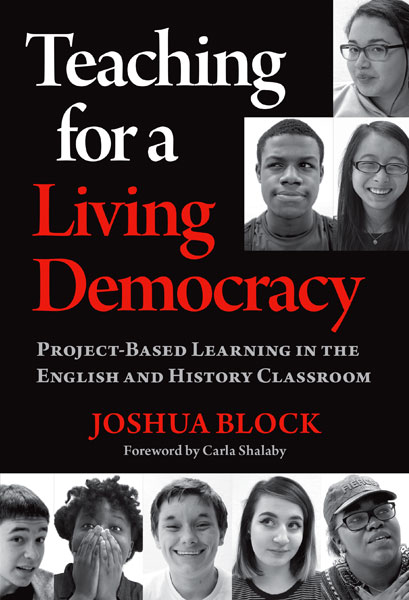Professors: Request an Exam Copy
Print copies available for US orders only. For orders outside the US, see our international distributors.
Foreword by: Carla Shalaby
Publication Date: April 17, 2020
Pages: 144

This classroom narrative explores how teachers can build and sustain an intellectually and emotionally fulfilling teaching practice while changing the way students experience school. Written by an English and history teacher in a Philadelphia public high school, this book presents a framework of teaching for a living democracy—supporting learners to produce intellectually rigorous and creative work by designing instruction that intersects with students' lives and interests. The text offers project-based units of study and classroom practices that allow students to reconfigure understandings of themselves, their capabilities, and their roles in the world. Packed with student voices and the work of youth, this book provides a rich window into classroom practices that challenge authoritarian tendencies while cultivating dignity and agency.
Book Features:
Joshua Block teaches public high school students English and history in Philadelphia. He is a teacher educator, a national board certified teacher, and recipient of a Fulbright Distinguished Award in Teaching.
“ Teaching for a Living Democracy: Project-Based Learning in the English and History Classroom offers both a method for civic engagement and a message of faith in the power of young people to serve as agents for change within their own communities right now.”
—Teachers College Record
“Using his own teaching practice as the foundation, Block illustrates effective, context-based principles that have allowed him to teach in ways that encourage democratic thought and civic engagement. He does not prescribe best practices, but rather invites the reader into his classroom to experience his projects, showing rather than telling what works. In his descriptions of classwork, Block presents a raw picture not only of classroom successes, but of challenges, pivots, and necessary adaptations that accurately depict the often messy space of learning.”
—Choice
“In a time when standardized tests are increasingly critiqued by teachers, students, families, and communities, Block’s work offers an important alternative to such emaciated yardsticks of ‘learning.’ Indeed, by showing us what is possible in a classroom, he provides us with more than a model: He gives us hope, an animating force in any democracy.”
—Democracy & Education
“Simultaneously inspirational and useful, this book is a visionary, hopeful invitation to dream and a practical, generous resource for translating our dreams into concrete new realities of teaching and learning. What a rare combination in a single text, and a gift that only a practicing teacher working and speaking from direct, daily experience is positioned to offer. We need books like this.”
—From the Foreword by Carla Shalaby, author of Troublemakers: Lessons in Freedom from Young Children at School
“The author’s argument for a ‘living democracy’ is both timely and compelling, illuminated with a richly detailed and accessible account of what it has meant—over 20 years in the classroom—to co-create a curriculum and pedagogy with his diverse group of urban students. Not only does this make his classroom an unusually engaged and lively space for learning that builds from his students’ interests, questions, lived experiences, and collaborative relationships, but together Block and his students have also found agentive ways to extend and deepen their inquiry by forging unique connections with people, places, and spaces in the wider community. A pedagogical tour de force, this book is a must-read for all those who seek new images of what it means to strive for and embrace a truly transformational view of schools and schooling.”
—Susan L. Lytle, Professor Emerita of Education, University of Pennsylvania
Contents (Tentative)
Foreword Carla Shalaby
Acknowledgments
1. Reframing School Learning
Teaching for a Living Democracy
Changing the Grammar of Schooling
My Teaching Context and Background
Agency and Possibility
2. Designing Curriculum for Deeper Learning
Immigration Oral History Projects
Advanced Essay Process
Modern Day de Tocquevilles
Coda
3. Elevating Student Voices and Truths
Acknowledging and Honoring Students’ Realities
Bulding Cohesive Classroom Communities
Making Learning Complex and Real
Prioritizing Student Voices, Decentralizing the Classroom
Coda
4. Envisioning New Roles for Teachers
Reframing Teacher Voice
Teachers as Facilitators
Teachers as Lead Collaborators
Teachers as Consultants and Scholars
Coda
5. Decolonizing School
Insights from Aotearoa, New Zealand
Biculturalism and Creating Space in Schools
The Re-PLACE-ing Project
Our Philadelphia, Our America
Coda
6. Engaging Multiple Realities of Teaching for a Living Democracy
Art in the Open
The Messy Process of Creation
Navigating Intolerance
Engaging Issues of the World
Coda
Epilogue: For Teachers
Appendix: Additional Classroom Resources
References
Index
About the Author
Professors: Request an Exam Copy
Print copies available for US orders only. For orders outside the US, see our international distributors.